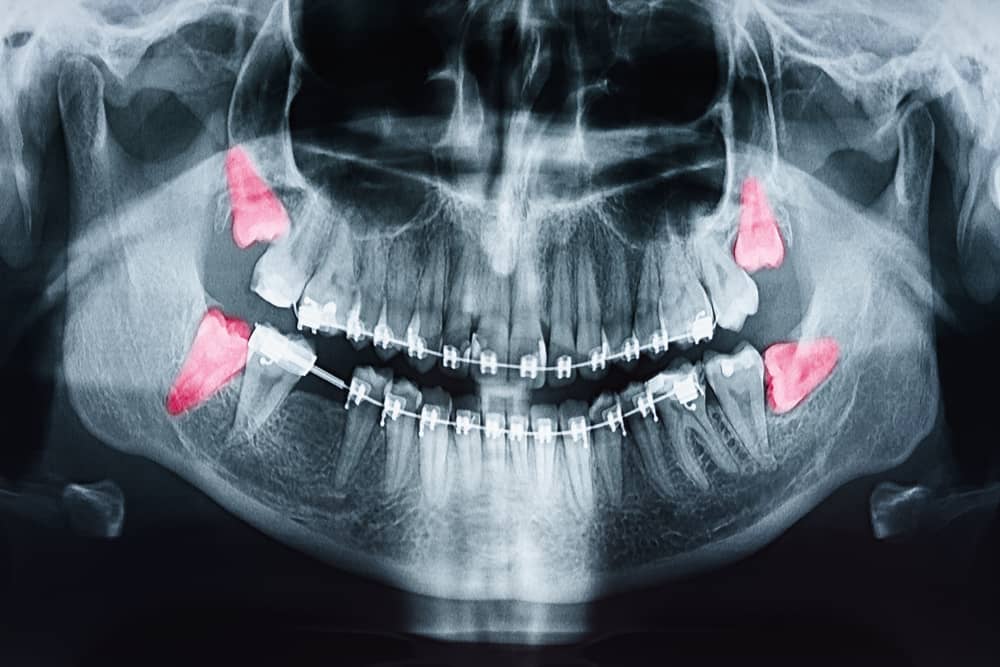
5 Answers to Common Questions About Wisdom Teeth
Our third molars, more commonly known as “wisdom teeth,” are typically our last set of molars to form. Most individuals will be referred to an oral surgeon to have them removed between the ages 16 and 22 because these teeth can have several problems. Here are the most common wisdom teeth questions.
1. Why Do My Wisdom Teeth Need to Be Extracted?
Space is the biggest issue when it comes to wisdom teeth. Evolutionary changes over hundreds of years have shifted our jaws toward a more retrusive (backward) position than our ancestors had. This means there is less actual space for our wisdom teeth to come in. When there is not enough space, the result is an impacted wisdom tooth.
Impacted wisdom teeth are more common than non-impacted ones. An impacted wisdom tooth may be fully submerged in the bone or partially erupted. Both are problematic and result in a referral to the oral surgeon for removal. A fully impacted tooth can cause problems for the tooth in front of it and it is at risk for cysts to form if left in the mouth for a long period of time. Partially erupted teeth are prime for infection of the gum tissue and bone, not to mention they are impossible to keep clean, creating a risk for cavities. Even when wisdom teeth erupt normally they are so far back in the mouth that they are difficult to keep clean in the long run.
2. Why Do All Have to Be Extracted?
It is very common to be missing one or more wisdom teeth because they just don’t develop. Or you may have extra wisdom teeth. We almost always recommend having all wisdom teeth extracted, even if one or two erupt normally.
Let’s say your upper right wisdom tooth erupted just fine but your lower right wisdom tooth is impacted. In this case, your upper right wisdom tooth is a non-functioning tooth because it doesn’t have a partner to meet up with. Over time, this tooth can supra-erupt (come too far out of the jawbone), causing problems for your other teeth, and will most likely need to be taken out anyway. It is easier to have all of your wisdom teeth extracted at the same time and avoid future complications.
3. At What Age Should I Do the Extraction?
Oral surgeons often prefer to remove wisdom teeth during the teenage years since the roots have not fully formed, reducing possible complications like nerve injury. It is also a much easier procedure for younger individuals to tolerate as our bone quality and healing ability decline with age.
4. When My Wisdom Teeth Come in, Will They Mess up My Orthodontic Work?
After orthodontic treatment, it is common to be referred to an oral surgeon to have your wisdom teeth removed. If you are wearing your retainers as instructed, your wisdom teeth will not shift your other teeth when they erupt. However, we all have a natural forward drive to our teeth and wisdom teeth add even more forward pressure, making shifting of your teeth more likely if you aren’t wearing your retainers. Having your wisdom teeth extracted helps reduce tooth movement.
5. Will Having Them Removed Hurt?
Your oral surgeon will have a consultation with you to discuss the procedure and your recovery time. It is most common to undergo IV sedation for the removal of wisdom teeth, which means you won’t remember the actual procedure. Your surgeon will also numb you up with local anesthetic after you are sedated so you will wake up feeling like you have a fat lip and tongue.
You will want to plan for some downtime for a few days after your wisdom teeth are removed, and be sure to follow your post-op instructions to avoid dry sockets or infection. Pain levels vary, however most people are able to manage their pain with ibuprofen or Tylenol.
Learn more about the most common wisdom teeth questions here.
At Milnor Orthodontics, our experts are here to help you achieve a priceless smile. Call our office at (970) 484-3214 or visit milnororthodontics.com to learn more. We're located at 1103 S. Shields St. in Fort Collins, Colorado.







